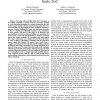Free Online Productivity Tools
i2Speak
i2Symbol
i2OCR
iTex2Img
iWeb2Print
iWeb2Shot
i2Type
iPdf2Split
iPdf2Merge
i2Bopomofo
i2Arabic
i2Style
i2Image
i2PDF
iLatex2Rtf
Sci2ools
116
click to vote
ISCAS
2008
IEEE
2008
IEEE
Non-traditional irregular interconnects for massive scale SoC
— By using self-assembling fabrication techniques at the cellular, molecular, or atomic scale, it is nowadays possible to create functional assemblies in a mainly bottom-up way that involve massive numbers of interconnected components. However, such assemblies are often highly irregular, unreliable, and heterogeneous. A grand challenge for future and emerging electronics is thus to reliably and efficiently compute and communicate in such systems. The goal of this paper is to illustrate why non-traditional network-on-chip paradigms are promising for massive scale systems and what the limits are. We have previously shown that certain irregular 3D assemblies and interconnects have major advantages over regular 2D and 3D mesh fabrics in terms of latency, throughput, scalability, and the robustness against simple link failures. We present these results from a complex network perspective and look into the scaling properties of different interconnect topologies and routing algorithms in an...
| Added | 31 May 2010 |
| Updated | 31 May 2010 |
| Type | Conference |
| Year | 2008 |
| Where | ISCAS |
| Authors | Christof Teuscher, Anders A. Hansson |
Comments (0)

